Methanol Chillers Market
Methanol Chillers Market Size and Share Forecast Outlook 2025 to 2035
The methanol chillers market is projected to grow from USD 430.0 million in 2025 to USD 690.0 million by 2035, at a CAGR of 4.8%. Closed-cycle will dominate with a 60.0% market share, while chemical process will lead the application segment with a 50.0% share.
Methanol Chillers Market Forecast and Outlook (2025-2035)
The global methanol chillers market is projected to grow from USD 430.0 million in 2025 to approximately USD 690.0 million by 2035, recording an absolute increase of USD 260.0 million over the forecast period. This translates into a total growth of 60.5%, with the market forecast to expand at a compound annual growth rate (CAGR) of 4.8% between 2025 and 2035.
The overall market size is expected to grow by nearly 1.6X during the same period, supported by increasing global demand for efficient cooling systems in chemical processing applications, growing adoption of methanol-based chillers in research facilities, and rising industrial requirements driving advanced cooling technology procurement across various manufacturing and processing applications.
Quick Stats for Methanol Chillers Market
- Methanol Chillers Market Value (2025): USD 430.0 million
- Methanol Chillers Market Forecast Value (2035): USD 690.0 million
- Methanol Chillers Market CAGR: 4.8%
- Leading Segment by Type (2025): Closed-cycle (60.0%)
- Leading Segment by Application (2025): Chemical Process (50.0%)
- Leading Segment by Scale (2025): Medium (40.0%)
- Key Growth Regions: Asia Pacific, North America, and Europe
- Top Companies by Market Share: Chart Industries, GEA, Cryostar
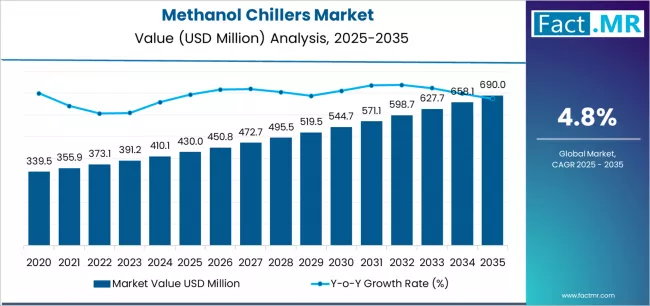
Laboratory managers across pharmaceutical research facilities express growing frustration with traditional cooling systems when conducting low-temperature synthesis reactions, driving gradual adoption of methanol chiller technologies despite concerns about safety protocols and handling procedures. Chemical processing plant operators report difficulties achieving precise temperature control with conventional refrigeration equipment, particularly when maintaining stable conditions for crystallization processes requiring temperature stability within narrow tolerance ranges that exceed standard industrial cooling capabilities.
Equipment procurement decisions involve extended safety evaluations where facility managers struggle to balance operational performance benefits against methanol handling risks and regulatory compliance requirements. Environmental health and safety personnel emphasize leak detection systems and emergency response protocols as essential factors influencing installation approval, often disagreeing with process engineers focused on cooling efficiency and temperature range capabilities. Maintenance supervisors express concern about specialized service requirements and technician training needs that differ significantly from conventional refrigeration system maintenance procedures.
Operational challenges center on methanol inventory management and leak prevention systems that require specialized protocols beyond conventional cooling system maintenance requirements. Plant operators report difficulties maintaining consistent cooling performance when methanol purity levels decline due to moisture absorption or contamination, requiring periodic fluid replacement and system purging procedures that increase operational complexity. Technical personnel describe complications with seal integrity monitoring when operating at extreme low temperatures, necessitating frequent inspection protocols and preventive maintenance scheduling.
Pharmaceutical manufacturing applications reveal stringent temperature control requirements and contamination prevention protocols that significantly influence equipment design specifications and operational procedures. Production managers express concern about validation requirements for temperature-critical processes where cooling system performance directly affects product quality and regulatory compliance. Quality assurance personnel note that temperature excursions can invalidate entire production batches, creating zero-tolerance specifications that exceed typical industrial cooling applications.
Emerging trends, such as integration of digital monitoring, IoT-enabled control systems, and predictive maintenance technologies, are expected to enhance methanol chiller performance, improve operational safety, and reduce downtime, supporting broader adoption across pharmaceutical, chemical, and specialized research applications globally.
Methanol Chillers Market Key Takeaways
| Metric | Value |
|---|---|
| Market Value (2025) | USD 430.0 million |
| Market Forecast Value (2035) | USD 690.0 million |
| Forecast CAGR (2025-2035) | 4.8% |
Why is the Methanol Chillers Market Growing?
| INDUSTRIAL PROCESS DEMANDS | TECHNOLOGICAL REQUIREMENTS | OPERATIONAL EFFICIENCY & QUALITY STANDARDS |
|---|---|---|
| Chemical Processing Expansion Continuous expansion of chemical manufacturing operations across established and emerging markets is driving demand for specialized cooling solutions tailored to methanol production facilities and industrial processing operations. Research Facility Growth Increasing adoption of advanced cooling systems for laboratory and pilot-scale environments highlights the importance of precision temperature management in methanol processing and analytical research. Industrial Manufacturing Superior cooling consistency and heat-exchange performance make methanol chillers essential for temperature-sensitive production and chemical stabilization processes across high-value industrial sectors. | Advanced Cooling Technology Requirements Modern chemical manufacturing requires high-performance chillers capable of delivering precise temperature control, corrosion resistance, and long-term operational stability under demanding thermal loads. Processing Performance Demands Industrial manufacturers are investing in specialized methanol chiller systems that maintain constant performance and thermal balance while optimizing process efficiency and energy use. Quality and Reliability Standards Certified producers with proven reliability are essential for supplying advanced methanol chiller systems that meet strict industrial specifications and minimize process variability. | Energy Efficiency Standards Operational and regulatory requirements continue to establish performance benchmarks favoring energy-efficient cooling systems with verifiable thermal management metrics. Performance Property Standards Industry standards mandate superior cooling capacity, chemical compatibility, and resistance to thermal cycling and operational stress across processing environments. Industrial Compliance Requirements Diverse chemical, environmental, and safety regulations are driving the need for highly efficient, low-emission, and compliance-certified methanol cooling system designs. |
Methanol Chillers Market Segmentation
| Category | Segments Covered |
|---|---|
| By Type | Closed-cycle, Open-cycle, Mobile/Skid |
| By Application | Chemical Process, Refrigeration, Research |
| By Scale | Small, Medium, Large |
| By Region | North America, Europe, Asia Pacific, Latin America, Middle East & Africa |
Methanol Chillers Market Analysis by Type
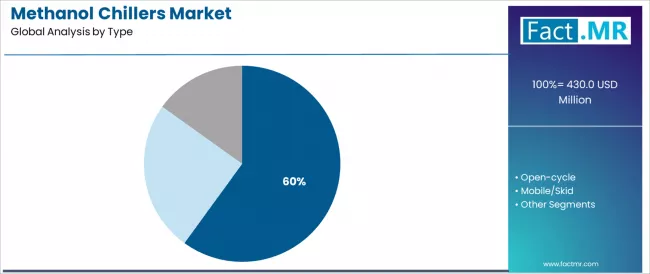
| Segment | 2025 to 2035 Outlook |
|---|---|
| Closed-cycle | Leader in 2025 with 60.0% market share; likely to maintain leadership through 2035. Broadest use in chemical processing, research applications, and industrial cooling, mature supply chain, predictable functionality. Momentum: steady-to-strong. Watchouts: equipment complexity requirements. |
| Open-cycle | Cost-effective solution established for specific cooling applications, but operational complexity limits broader adoption in specialized industrial applications. Momentum: steady in traditional applications; flat to slightly up in premium segments. |
| Mobile/Skid | Benefiting from flexibility requirements due to portable design properties and enhanced deployment characteristics. Momentum: rising. Watchouts: transportation complexity, technical qualification requirements. |
Methanol Chillers Market Analysis by Application
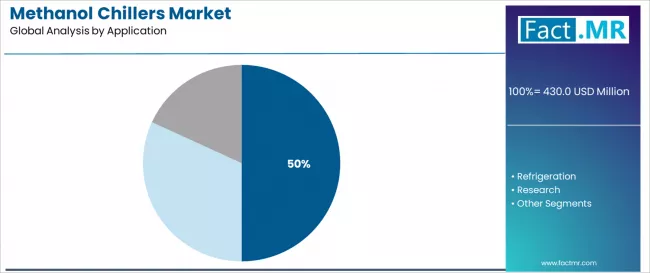
| Segment | 2025 to 2035 Outlook |
|---|---|
| Chemical Process | At 50.0%, largest application segment in 2025 with established methanol chiller integration. Mature supply chains, standardized processing specifications. Momentum: steady growth driven by chemical industry expansion and specialized cooling demand. Watchouts: regulatory changes affecting processing requirements. |
| Refrigeration | Strong application segment driven by industrial cooling and temperature control demand. Closed-cycle and open-cycle chillers dominate applications. Momentum: moderate growth through 2030, supported by industrial cooling requirements. Watchouts: competition from alternative cooling technologies. |
| Research | Specialized segment with diverse cooling requirements. Growing demand for laboratory-grade cooling supporting research applications. Momentum: moderate growth via research facility expansion and scientific innovation. Watchouts: budget constraints affecting research equipment procurement. |
Methanol Chillers Market Analysis by Scale
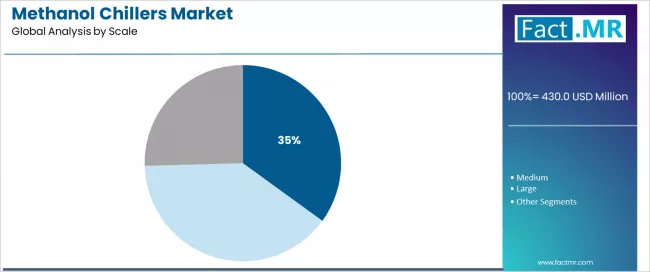
| Scale | Status & Outlook 2025-2035 |
|---|---|
| Small | Established scale in 2025 with 35.0% share for specialized applications. Compact systems, processing advantages, ease of installation. Momentum: steady growth driven by small-scale operations and specialized cooling requirements. Watchouts: limited capacity for large applications. |
| Medium | Dominant scale in 2025 with 40.0% share for industrial applications. Balanced performance systems, operational advantages, versatile deployment. Momentum: strong growth driven by industrial expansion and processing efficiency. Watchouts: competition from larger systems. |
| Large | Important for high-capacity applications requiring extensive cooling. Value-add through superior capacity properties, custom configurations, specialized processing. Momentum: moderate growth as large-scale applications demand enhanced capabilities. Installation complexity may limit broader adoption. |
DRIVERS
| DRIVERS | RESTRAINTS | KEY TRENDS |
|---|---|---|
| Industrial Process Growth Continuing expansion of chemical and manufacturing activities across established and emerging markets is driving demand for efficient cooling solutions that ensure reliable temperature management and process stability in methanol-based operations. Chemical Industry Expansion Increasing adoption of advanced cooling systems underscores the importance of precise temperature regulation in methanol production and broader chemical manufacturing workflows. Research Facility Development Growing investment in laboratory and pilot-scale methanol research facilities is driving demand for compact, high-performance chillers capable of stable and consistent cooling in specialized applications. | Equipment Cost Considerations Price fluctuations and high capital costs for advanced cooling systems are influencing acquisition decisions, impacting procurement cycles, and limiting technology adoption among smaller facilities. Technical Complexity Complex technical specifications, including temperature range requirements, chemical compatibility, and fluid handling parameters, are affecting system design and standardization processes. Technical Qualification Requirements Extensive testing and certification requirements for chemical compatibility, energy efficiency, and safety compliance are increasing development costs and time-to-market for manufacturers. Competition from Alternatives Alternative cooling and temperature regulation technologies, including evaporative and absorption systems, are influencing market adoption strategies and equipment selection. | Advanced Processing Technologies Integration of next-generation chiller systems, smart manufacturing controls, and precision temperature management technologies is enabling superior efficiency and long-term operational reliability. Performance Enhancement Enhanced cooling precision, improved process control, and higher operational consistency compared to conventional refrigeration or open-loop cooling systems. Specialized Configurations Development of application-specific chiller grades and modular system designs tailored for chemical, research, and industrial applications offering enhanced performance and energy optimization. Technical Innovation Integration of advanced chiller development with intelligent process management, IoT connectivity, and predictive maintenance capabilities for highly adaptive, data-driven cooling solutions. |
Analysis of Methanol Chillers Market by Key Countries
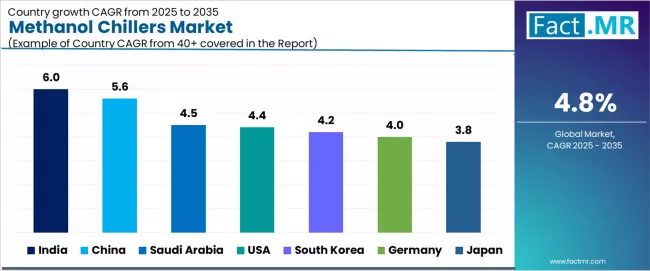
| Country | CAGR (2025-2035) |
|---|---|
| India | 6.0% |
| China | 5.6% |
| Saudi Arabia | 4.5% |
| USA | 4.4% |
| South Korea | 4.2% |
| Germany | 4.0% |
| Japan | 3.8% |
India Leads Global Market Growth with Industrial Excellence
Revenue from methanol chillers in India is projected to exhibit strong growth driven by expanding industrial infrastructure and comprehensive manufacturing innovation creating opportunities for cooling system suppliers across chemical processing operations, research applications, and specialized industrial sectors.
The country's developing manufacturing tradition and expanding industrial capabilities are creating demand for both conventional and high-performance cooling equipment. Major industrial companies are establishing comprehensive local cooling system facilities to support large-scale manufacturing operations and meet growing demand for efficient temperature control solutions.
Industrial development programs are supporting widespread adoption of advanced cooling technology across manufacturing operations, driving demand for high-quality equipment. Manufacturing processing excellence initiatives and specialized industrial development are creating opportunities for cooling system suppliers requiring reliable performance and cost-effective solutions. Chemical processing manufacturing growth and industrial facility development are facilitating adoption of specialty cooling equipment throughout major industrial regions.
China Demonstrates Strong Market Potential with Manufacturing Growth
Revenue from methanol chillers in China is expanding supported by extensive industrial manufacturing expansion and comprehensive processing industry development creating demand for reliable cooling equipment across diverse manufacturing categories and specialized industrial segments.
The country's dominant manufacturing position and expanding industrial capabilities are driving demand for cooling solutions that provide consistent performance while supporting cost-effective processing requirements. Industrial processors and manufacturers are investing in local production facilities to support growing manufacturing operations and chemical processing demand.
Manufacturing operations expansion and industrial processing capability development are creating opportunities for cooling equipment across diverse manufacturing segments requiring reliable temperature control and competitive processing costs. Manufacturing modernization and processing technology advancement are driving investments in industrial supply chains supporting performance requirements throughout major industrial regions. Industrial manufacturing growth and specialty processing development programs are enhancing demand for cooling equipment throughout production areas.
USA Maintains Strong Position with Industrial Innovation
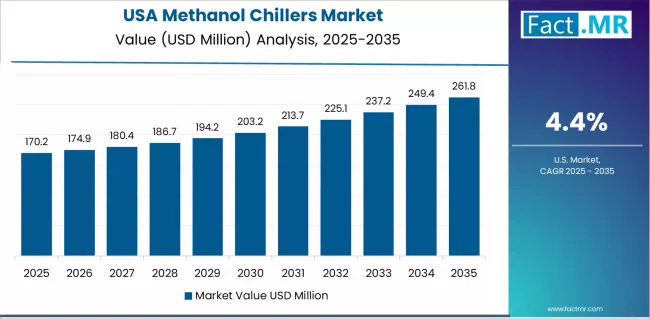
Demand for methanol chillers in USA is projected to grow supported by the country's expanding industrial manufacturing base and processing technologies requiring advanced cooling systems for chemical production and research applications. American industrial companies are implementing cooling systems that support advanced manufacturing techniques, operational efficiency, and comprehensive quality protocols. The market is characterized by focus on operational excellence, processing performance, and compliance with industrial quality standards.
Industrial facility investments are prioritizing advanced cooling technologies that demonstrate superior performance and quality while meeting American manufacturing standards. Processing leadership programs and operational excellence initiatives are driving adoption of precision-engineered cooling equipment that supports advanced manufacturing systems and performance optimization. Research and development programs for cooling enhancement are facilitating adoption of specialized processing techniques throughout major industrial centers.
Germany Focuses on Precision Industrial Manufacturing
Demand for methanol chillers in Germany is projected to grow driven by precision manufacturing excellence and specialty cooling capabilities supporting advanced industrial development and comprehensive chemical processing applications. The country's established industrial processing tradition and growing performance manufacturing market segments are creating demand for high-quality cooling equipment that supports operational performance and industrial standards. Manufacturing companies and processing suppliers are maintaining comprehensive development capabilities to support diverse manufacturing requirements.
Precision industrial manufacturing and specialty cooling programs are supporting demand for processing-grade methanol chillers that meet contemporary performance and reliability standards. Industrial development and performance-focused manufacturing programs are creating opportunities for specialized cooling equipment that provides comprehensive industrial support. Manufacturing modernization and industrial quality enhancement programs are facilitating adoption of advanced processing capabilities throughout major manufacturing regions.
Saudi Arabia Focuses on Petrochemical Manufacturing
Demand for methanol chillers in Saudi Arabia is projected to grow at 4.5% CAGR driven by petrochemical manufacturing excellence and specialty cooling capabilities supporting chemical processing development and comprehensive industrial applications. The country's established petrochemical processing tradition and growing industrial market segments are creating demand for high-quality cooling equipment that supports operational performance and chemical processing standards.
Petrochemical manufacturing and specialty cooling programs are supporting demand for processing-grade methanol chillers that meet contemporary performance and reliability standards. Chemical processing development and performance-focused manufacturing programs are creating opportunities for specialized cooling equipment that provides comprehensive industrial support. Manufacturing modernization and chemical processing quality enhancement programs are facilitating adoption of advanced cooling capabilities throughout major petrochemical regions.
South Korea Focuses on Advanced Manufacturing
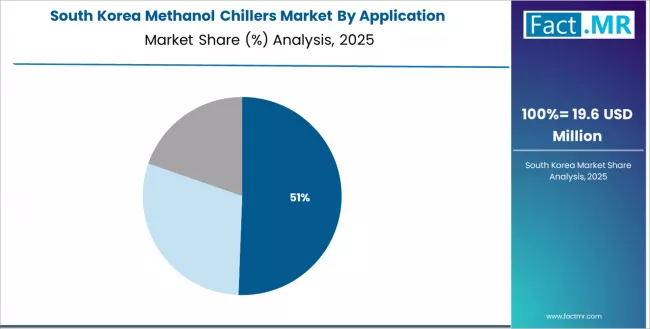
Demand for methanol chillers in South Korea is projected to grow at 4.2% CAGR driven by advanced manufacturing excellence and specialty cooling capabilities supporting industrial development and comprehensive processing applications. The country's established manufacturing tradition and growing performance industrial market segments are creating demand for high-quality cooling equipment that supports operational performance and manufacturing standards.
Advanced manufacturing and specialty cooling programs are supporting demand for processing-grade methanol chillers that meet contemporary performance and reliability standards. Industrial development and performance-focused manufacturing programs are creating opportunities for specialized cooling equipment that provides comprehensive manufacturing support. Processing modernization and industrial quality enhancement programs are facilitating adoption of advanced cooling capabilities throughout major manufacturing regions.
Japan Focuses on Precision Technology Manufacturing
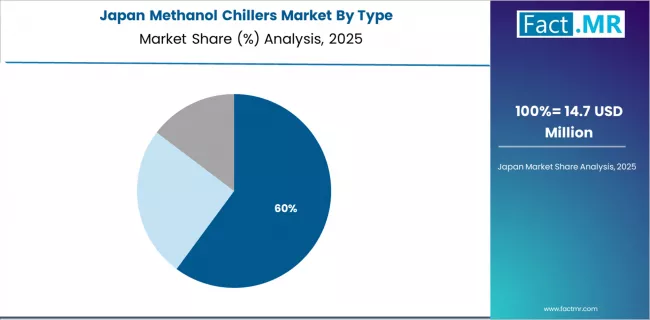
Demand for methanol chillers in Japan is projected to grow driven by precision technology manufacturing excellence and specialty cooling capabilities supporting advanced industrial development and comprehensive technical applications. The country's established manufacturing tradition and growing performance technology market segments are creating demand for high-quality cooling equipment that supports operational performance and manufacturing standards.
Precision technology manufacturing and specialty cooling programs are supporting demand for processing-grade methanol chillers that meet contemporary performance and reliability standards. Industrial development and performance-focused manufacturing programs are creating opportunities for specialized cooling equipment that provides comprehensive technical support. Manufacturing modernization and technology quality enhancement programs are facilitating adoption of advanced cooling capabilities throughout major technology regions.
Europe Market Split by Processing Application
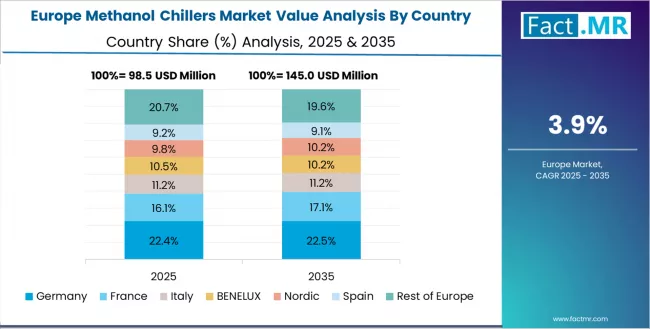
European methanol chillers operations are increasingly polarized between Western European precision processing and Eastern European cost-competitive manufacturing. German (USD 95.0 million) and UK facilities (USD 70.0 million) dominate precision industrial cooling and chemical processing applications, leveraging advanced cooling technologies and strict quality protocols that command price premiums in global markets. German processors maintain leadership in high-performance cooling applications, with major industrial companies driving technical specifications that smaller suppliers must meet to access supply contracts.
France (USD 55.0 million), Italy (USD 45.0 million), and Spain (USD 35.0 million) operations focus on specialized applications and regional market requirements. Rest of Europe (USD 130.0 million) including Eastern European operations in Poland, Hungary, and Czech Republic are capturing volume-oriented processing contracts through labor cost advantages and EU regulatory compliance, particularly in standard cooling equipment for industrial applications.
The regulatory environment presents both opportunities and constraints. EU industrial equipment directives and processing standards create barriers for novel cooling technologies but establish quality standards that favor established European processors over imports. Brexit has fragmented UK sourcing from EU suppliers, creating opportunities for direct relationships between processors and British industrial manufacturers.
Supply chain consolidation accelerates as processors seek economies of scale to absorb rising energy costs and compliance expenses. Vertical integration increases, with major industrial manufacturers acquiring processing facilities to secure cooling equipment supplies and quality control. Smaller processors face pressure to specialize in niche applications or risk displacement by larger, more efficient operations serving mainstream industrial manufacturing requirements.
Premium Quality Standards Define Japanese Market Dynamics
Japanese methanol chillers operations reflect the country's exacting quality standards and sophisticated industrial expectations. Major manufacturing companies maintain rigorous supplier qualification processes that often exceed international standards, requiring extensive documentation, batch testing, and facility audits that can take 12-18 months to complete. This creates high barriers for new suppliers but ensures consistent quality that supports premium product positioning.
The Japanese market demonstrates unique application preferences with Chemical Process accounting for 60.0%, Refrigeration 20.0%, and Research 20.0%. Companies require specific cooling specifications and performance requirements that differ from Western applications, driving demand for customized processing capabilities.
Japanese market demonstrates unique type preferences with Closed-cycle accounting for 65.0%, Open-cycle 20.0%, and Mobile 15.0%. Companies require specific operational specifications and performance characteristics that differ from Western applications, driving demand for customized cooling capabilities.
Regulatory oversight emphasizes comprehensive industrial equipment management and traceability requirements that surpass most international standards. The industrial equipment registration system requires detailed equipment sourcing information, creating advantages for suppliers with transparent supply chains and comprehensive documentation systems.
Supply chain management focuses on relationship-based partnerships rather than purely transactional procurement. Japanese companies typically maintain long-term supplier relationships spanning decades, with annual contract negotiations emphasizing quality consistency over price competition. This stability supports investment in specialized processing equipment tailored to Japanese specifications.
Market Dynamics Drive Innovation in South Korea
South Korean methanol chillers operations reflect the country's advanced manufacturing sector and export-oriented business model. Major industrial companies drive sophisticated equipment procurement strategies, establishing direct relationships with global suppliers to secure consistent quality and pricing for their chemical processing and manufacturing operations targeting both domestic and international markets.
The Korean market demonstrates strength in application distribution with Chemical Process accounting for 55.0%, Refrigeration 30.0%, and Research 15.0%. This industry-focused approach creates demand for specific cooling specifications that differ from Western applications, requiring suppliers to adapt design and processing techniques.
Regulatory frameworks emphasize industrial equipment safety and traceability, with Korean industrial administration standards often exceeding international requirements. This creates barriers for smaller equipment suppliers but benefits established processors who can demonstrate compliance capabilities. The regulatory environment particularly favors suppliers with comprehensive certification and documentation systems.
Supply chain efficiency remains critical given Korea's geographic limitations and import dependence. Companies increasingly pursue long-term contracts with suppliers in United States, Germany, and Japan to ensure reliable access to equipment while managing foreign exchange risks. Technical logistics investments support quality preservation during extended shipping periods.
The market faces pressure from rising labor costs and competition from lower-cost regional manufacturers, driving automation investments and consolidation among smaller processors. The premium positioning of Korean industrial brands internationally continues to support demand for high-quality cooling equipment that meets stringent specifications.
Competitive Landscape of Methanol Chillers Market
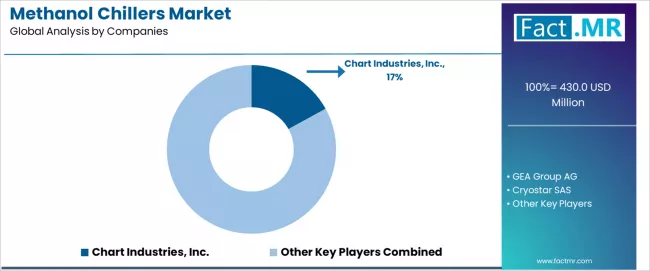
Profit pools are consolidating upstream in scaled cooling system production and downstream in value-added specialty configurations for chemical processing, refrigeration, and research applications where certification, traceability, and consistent performance command premiums. Value is migrating from standard cooling equipment trading to specification-tight, application-ready systems where technical expertise and quality control drive competitive advantage.
Several archetypes set the pace: global cooling integrators defending share through production scale and technical reliability; multi-configuration processors that manage complexity and serve diverse applications; specialty cooling developers with engineering expertise and industrial ties; and performance-driven suppliers pulling volume in chemical processing and research applications.
Switching costs, re-qualification, performance testing, performance validation, provide stability for incumbents, while supply shocks and regulatory changes reopen opportunities for diversified suppliers. Consolidation and verticalization continue; digital procurement emerges in standard grades while premium specifications remain relationship led.
Focus areas: lock chemical processing and industrial pipelines with application-specific configurations and service level agreements; establish multi-scale production capabilities and technical disclosure; develop specialized cooling formulations with performance claims.
| Stakeholder Type | Primary Advantage | Repeatable Plays |
|---|---|---|
| Global cooling integrators | Scale, production integration, technical reliability | Long-term contracts, tight specs, co-development with chemical processing/industrial |
| Multi-configuration processors | Configuration diversification, application expertise, supply flexibility | Multi-application serving, technical support, quality assurance across segments |
| Specialty cooling developers | Engineering expertise and industry relationships | Custom configurations, performance science, performance SLAs |
| Performance suppliers | Application-focused demand and specialized service | Technical performance claims, specialized configurations, application activation |
| Industrial distributors & platforms | Technical support for mid-tier manufacturers | Configuration selection, smaller volumes, technical service |
Key Players in the Methanol Chillers Market
- Chart Industries, Inc.
- GEA Group AG
- Cryostar SAS
- SPX FLOW, Inc.
- Mayekawa Mfg. Co., Ltd.
- The Linde Group
- Air Liquide S.A.
- Atlas Copco AB
- MTA S.p.A.
- Mitsubishi Heavy Industries, Ltd.
- Howden Group Ltd.
- Frascold S.p.A.
- Haskel International, Inc.
- Cryomech, Inc.
- Ebara Corporation
Scope of the Report
| Items | Values |
|---|---|
| Quantitative Units (2025) | USD 430.0 Million |
| Type | Closed-cycle, Open-cycle, Mobile/Skid |
| Application | Chemical Process, Refrigeration, Research |
| Scale | Small, Medium, Large |
| Regions Covered | North America, Europe, Asia Pacific, Latin America, Middle East & Africa |
| Countries Covered | United States, Germany, China, Japan, India, South Korea, Saudi Arabia, and other 40+ countries |
| Key Companies Profiled | Chart Industries, GEA, Cryostar, SPX, Mayekawa, Linde, Air Liquide, Atlas Copco, MTA, Mitsubishi Heavy, Howden, Frascold, Haskel, Cryomech, Ebara |
| Additional Attributes | Dollar sales by product/application/scale, regional demand (NA, EU, APAC), competitive landscape, small vs. large adoption, production/processing integration, and advanced processing innovations driving performance enhancement, technical advancement, and efficiency |
Methanol Chillers Market Segmentation
-
By Type :
- Closed-cycle
- Open-cycle
- Mobile/Skid
-
By Application :
- Chemical Process
- Refrigeration
- Research
-
By Scale :
- Small
- Medium
- Large
-
By Region :
- North America
- Europe
- Asia Pacific
- Latin America
- Middle East & Africa
Table of Content
- Executive Summary
- Global Market Outlook
- Demand to side Trends
- Supply to side Trends
- Technology Roadmap Analysis
- Analysis and Recommendations
- Market Overview
- Market Coverage / Taxonomy
- Market Definition / Scope / Limitations
- Market Background
- Market Dynamics
- Drivers
- Restraints
- Opportunity
- Trends
- Scenario Forecast
- Demand in Optimistic Scenario
- Demand in Likely Scenario
- Demand in Conservative Scenario
- Opportunity Map Analysis
- Product Life Cycle Analysis
- Supply Chain Analysis
- Investment Feasibility Matrix
- Value Chain Analysis
- PESTLE and Porter’s Analysis
- Regulatory Landscape
- Regional Parent Market Outlook
- Production and Consumption Statistics
- Import and Export Statistics
- Market Dynamics
- Global Market Analysis 2020 to 2024 and Forecast, 2025 to 2035
- Historical Market Size Value (USD Million) Analysis, 2020 to 2024
- Current and Future Market Size Value (USD Million) Projections, 2025 to 2035
- Y to o to Y Growth Trend Analysis
- Absolute $ Opportunity Analysis
- Global Market Pricing Analysis 2020 to 2024 and Forecast 2025 to 2035
- Global Market Analysis 2020 to 2024 and Forecast 2025 to 2035, By Type
- Introduction / Key Findings
- Historical Market Size Value (USD Million) Analysis By Type , 2020 to 2024
- Current and Future Market Size Value (USD Million) Analysis and Forecast By Type , 2025 to 2035
- Closed-cycle
- Open-cycle
- Mobile/Skid
- Y to o to Y Growth Trend Analysis By Type , 2020 to 2024
- Absolute $ Opportunity Analysis By Type , 2025 to 2035
- Global Market Analysis 2020 to 2024 and Forecast 2025 to 2035, By Application
- Introduction / Key Findings
- Historical Market Size Value (USD Million) Analysis By Application, 2020 to 2024
- Current and Future Market Size Value (USD Million) Analysis and Forecast By Application, 2025 to 2035
- Chemical Process
- Refrigeration
- Research
- Y to o to Y Growth Trend Analysis By Application, 2020 to 2024
- Absolute $ Opportunity Analysis By Application, 2025 to 2035
- Global Market Analysis 2020 to 2024 and Forecast 2025 to 2035, By Scale
- Introduction / Key Findings
- Historical Market Size Value (USD Million) Analysis By Scale, 2020 to 2024
- Current and Future Market Size Value (USD Million) Analysis and Forecast By Scale, 2025 to 2035
- Small
- Medium
- Large
- Y to o to Y Growth Trend Analysis By Scale, 2020 to 2024
- Absolute $ Opportunity Analysis By Scale, 2025 to 2035
- Global Market Analysis 2020 to 2024 and Forecast 2025 to 2035, By Region
- Introduction
- Historical Market Size Value (USD Million) Analysis By Region, 2020 to 2024
- Current Market Size Value (USD Million) Analysis and Forecast By Region, 2025 to 2035
- North America
- Latin America
- Western Europe
- Eastern Europe
- East Asia
- South Asia and Pacific
- Middle East & Africa
- Market Attractiveness Analysis By Region
- North America Market Analysis 2020 to 2024 and Forecast 2025 to 2035, By Country
- Historical Market Size Value (USD Million) Trend Analysis By Market Taxonomy, 2020 to 2024
- Market Size Value (USD Million) Forecast By Market Taxonomy, 2025 to 2035
- By Country
- USA
- Canada
- Mexico
- By Type
- By Application
- By Scale
- By Country
- Market Attractiveness Analysis
- By Country
- By Type
- By Application
- By Scale
- Key Takeaways
- Latin America Market Analysis 2020 to 2024 and Forecast 2025 to 2035, By Country
- Historical Market Size Value (USD Million) Trend Analysis By Market Taxonomy, 2020 to 2024
- Market Size Value (USD Million) Forecast By Market Taxonomy, 2025 to 2035
- By Country
- Brazil
- Chile
- Rest of Latin America
- By Type
- By Application
- By Scale
- By Country
- Market Attractiveness Analysis
- By Country
- By Type
- By Application
- By Scale
- Key Takeaways
- Western Europe Market Analysis 2020 to 2024 and Forecast 2025 to 2035, By Country
- Historical Market Size Value (USD Million) Trend Analysis By Market Taxonomy, 2020 to 2024
- Market Size Value (USD Million) Forecast By Market Taxonomy, 2025 to 2035
- By Country
- Germany
- UK
- Italy
- Spain
- France
- Nordic
- BENELUX
- Rest of Western Europe
- By Type
- By Application
- By Scale
- By Country
- Market Attractiveness Analysis
- By Country
- By Type
- By Application
- By Scale
- Key Takeaways
- Eastern Europe Market Analysis 2020 to 2024 and Forecast 2025 to 2035, By Country
- Historical Market Size Value (USD Million) Trend Analysis By Market Taxonomy, 2020 to 2024
- Market Size Value (USD Million) Forecast By Market Taxonomy, 2025 to 2035
- By Country
- Russia
- Poland
- Hungary
- Balkan & Baltic
- Rest of Eastern Europe
- By Type
- By Application
- By Scale
- By Country
- Market Attractiveness Analysis
- By Country
- By Type
- By Application
- By Scale
- Key Takeaways
- East Asia Market Analysis 2020 to 2024 and Forecast 2025 to 2035, By Country
- Historical Market Size Value (USD Million) Trend Analysis By Market Taxonomy, 2020 to 2024
- Market Size Value (USD Million) Forecast By Market Taxonomy, 2025 to 2035
- By Country
- China
- Japan
- South Korea
- By Type
- By Application
- By Scale
- By Country
- Market Attractiveness Analysis
- By Country
- By Type
- By Application
- By Scale
- Key Takeaways
- South Asia and Pacific Market Analysis 2020 to 2024 and Forecast 2025 to 2035, By Country
- Historical Market Size Value (USD Million) Trend Analysis By Market Taxonomy, 2020 to 2024
- Market Size Value (USD Million) Forecast By Market Taxonomy, 2025 to 2035
- By Country
- India
- ASEAN
- Australia & New Zealand
- Rest of South Asia and Pacific
- By Type
- By Application
- By Scale
- By Country
- Market Attractiveness Analysis
- By Country
- By Type
- By Application
- By Scale
- Key Takeaways
- Middle East & Africa Market Analysis 2020 to 2024 and Forecast 2025 to 2035, By Country
- Historical Market Size Value (USD Million) Trend Analysis By Market Taxonomy, 2020 to 2024
- Market Size Value (USD Million) Forecast By Market Taxonomy, 2025 to 2035
- By Country
- Kingdom of Saudi Arabia
- Other GCC Countries
- Turkiye
- South Africa
- Other African Union
- Rest of Middle East & Africa
- By Type
- By Application
- By Scale
- By Country
- Market Attractiveness Analysis
- By Country
- By Type
- By Application
- By Scale
- Key Takeaways
- Key Countries Market Analysis
- USA
- Pricing Analysis
- Market Share Analysis, 2024
- By Type
- By Application
- By Scale
- Canada
- Pricing Analysis
- Market Share Analysis, 2024
- By Type
- By Application
- By Scale
- Mexico
- Pricing Analysis
- Market Share Analysis, 2024
- By Type
- By Application
- By Scale
- Brazil
- Pricing Analysis
- Market Share Analysis, 2024
- By Type
- By Application
- By Scale
- Chile
- Pricing Analysis
- Market Share Analysis, 2024
- By Type
- By Application
- By Scale
- Germany
- Pricing Analysis
- Market Share Analysis, 2024
- By Type
- By Application
- By Scale
- UK
- Pricing Analysis
- Market Share Analysis, 2024
- By Type
- By Application
- By Scale
- Italy
- Pricing Analysis
- Market Share Analysis, 2024
- By Type
- By Application
- By Scale
- Spain
- Pricing Analysis
- Market Share Analysis, 2024
- By Type
- By Application
- By Scale
- France
- Pricing Analysis
- Market Share Analysis, 2024
- By Type
- By Application
- By Scale
- India
- Pricing Analysis
- Market Share Analysis, 2024
- By Type
- By Application
- By Scale
- ASEAN
- Pricing Analysis
- Market Share Analysis, 2024
- By Type
- By Application
- By Scale
- Australia & New Zealand
- Pricing Analysis
- Market Share Analysis, 2024
- By Type
- By Application
- By Scale
- China
- Pricing Analysis
- Market Share Analysis, 2024
- By Type
- By Application
- By Scale
- Japan
- Pricing Analysis
- Market Share Analysis, 2024
- By Type
- By Application
- By Scale
- South Korea
- Pricing Analysis
- Market Share Analysis, 2024
- By Type
- By Application
- By Scale
- Russia
- Pricing Analysis
- Market Share Analysis, 2024
- By Type
- By Application
- By Scale
- Poland
- Pricing Analysis
- Market Share Analysis, 2024
- By Type
- By Application
- By Scale
- Hungary
- Pricing Analysis
- Market Share Analysis, 2024
- By Type
- By Application
- By Scale
- Kingdom of Saudi Arabia
- Pricing Analysis
- Market Share Analysis, 2024
- By Type
- By Application
- By Scale
- Turkiye
- Pricing Analysis
- Market Share Analysis, 2024
- By Type
- By Application
- By Scale
- South Africa
- Pricing Analysis
- Market Share Analysis, 2024
- By Type
- By Application
- By Scale
- USA
- Market Structure Analysis
- Competition Dashboard
- Competition Benchmarking
- Market Share Analysis of Top Players
- By Regional
- By Type
- By Application
- By Scale
- Competition Analysis
- Competition Deep Dive
- Chart Industries, Inc.
- Overview
- Product Portfolio
- Profitability by Market Segments (Product/Age /Sales Channel/Region)
- Sales Footprint
- Strategy Overview
- Marketing Strategy
- Product Strategy
- Channel Strategy
- GEA Group AG
- Cryostar SAS
- SPX FLOW, Inc.
- Mayekawa Mfg. Co., Ltd.
- The Linde Group
- Air Liquide S.A.
- Atlas Copco AB
- MTA S.p.A.
- Mitsubishi Heavy Industries, Ltd.
- Howden Group Ltd.
- Frascold S.p.A.
- Haskel International, Inc.
- Cryomech, Inc.
- Ebara Corporation
- Chart Industries, Inc.
- Competition Deep Dive
- Assumptions & Acronyms Used
- Research Methodology
List Of Table
- Table 1: Global Market Value (USD Million) Forecast by Region, 2020 to 2035
- Table 2: Global Market Value (USD Million) Forecast by Type , 2020 to 2035
- Table 3: Global Market Value (USD Million) Forecast by Application, 2020 to 2035
- Table 4: Global Market Value (USD Million) Forecast by Scale, 2020 to 2035
- Table 5: North America Market Value (USD Million) Forecast by Country, 2020 to 2035
- Table 6: North America Market Value (USD Million) Forecast by Type , 2020 to 2035
- Table 7: North America Market Value (USD Million) Forecast by Application, 2020 to 2035
- Table 8: North America Market Value (USD Million) Forecast by Scale, 2020 to 2035
- Table 9: Latin America Market Value (USD Million) Forecast by Country, 2020 to 2035
- Table 10: Latin America Market Value (USD Million) Forecast by Type , 2020 to 2035
- Table 11: Latin America Market Value (USD Million) Forecast by Application, 2020 to 2035
- Table 12: Latin America Market Value (USD Million) Forecast by Scale, 2020 to 2035
- Table 13: Western Europe Market Value (USD Million) Forecast by Country, 2020 to 2035
- Table 14: Western Europe Market Value (USD Million) Forecast by Type , 2020 to 2035
- Table 15: Western Europe Market Value (USD Million) Forecast by Application, 2020 to 2035
- Table 16: Western Europe Market Value (USD Million) Forecast by Scale, 2020 to 2035
- Table 17: Eastern Europe Market Value (USD Million) Forecast by Country, 2020 to 2035
- Table 18: Eastern Europe Market Value (USD Million) Forecast by Type , 2020 to 2035
- Table 19: Eastern Europe Market Value (USD Million) Forecast by Application, 2020 to 2035
- Table 20: Eastern Europe Market Value (USD Million) Forecast by Scale, 2020 to 2035
- Table 21: East Asia Market Value (USD Million) Forecast by Country, 2020 to 2035
- Table 22: East Asia Market Value (USD Million) Forecast by Type , 2020 to 2035
- Table 23: East Asia Market Value (USD Million) Forecast by Application, 2020 to 2035
- Table 24: East Asia Market Value (USD Million) Forecast by Scale, 2020 to 2035
- Table 25: South Asia and Pacific Market Value (USD Million) Forecast by Country, 2020 to 2035
- Table 26: South Asia and Pacific Market Value (USD Million) Forecast by Type , 2020 to 2035
- Table 27: South Asia and Pacific Market Value (USD Million) Forecast by Application, 2020 to 2035
- Table 28: South Asia and Pacific Market Value (USD Million) Forecast by Scale, 2020 to 2035
- Table 29: Middle East & Africa Market Value (USD Million) Forecast by Country, 2020 to 2035
- Table 30: Middle East & Africa Market Value (USD Million) Forecast by Type , 2020 to 2035
- Table 31: Middle East & Africa Market Value (USD Million) Forecast by Application, 2020 to 2035
- Table 32: Middle East & Africa Market Value (USD Million) Forecast by Scale, 2020 to 2035
List Of Figures
- Figure 1: Global Market Pricing Analysis
- Figure 2: Global Market Value (USD Million) Forecast 2020-2035
- Figure 3: Global Market Value Share and BPS Analysis by Type , 2025 and 2035
- Figure 4: Global Market Y to o to Y Growth Comparison by Type , 2025-2035
- Figure 5: Global Market Attractiveness Analysis by Type
- Figure 6: Global Market Value Share and BPS Analysis by Application, 2025 and 2035
- Figure 7: Global Market Y to o to Y Growth Comparison by Application, 2025-2035
- Figure 8: Global Market Attractiveness Analysis by Application
- Figure 9: Global Market Value Share and BPS Analysis by Scale, 2025 and 2035
- Figure 10: Global Market Y to o to Y Growth Comparison by Scale, 2025-2035
- Figure 11: Global Market Attractiveness Analysis by Scale
- Figure 12: Global Market Value (USD Million) Share and BPS Analysis by Region, 2025 and 2035
- Figure 13: Global Market Y to o to Y Growth Comparison by Region, 2025-2035
- Figure 14: Global Market Attractiveness Analysis by Region
- Figure 15: North America Market Incremental Dollar Opportunity, 2025-2035
- Figure 16: Latin America Market Incremental Dollar Opportunity, 2025-2035
- Figure 17: Western Europe Market Incremental Dollar Opportunity, 2025-2035
- Figure 18: Eastern Europe Market Incremental Dollar Opportunity, 2025-2035
- Figure 19: East Asia Market Incremental Dollar Opportunity, 2025-2035
- Figure 20: South Asia and Pacific Market Incremental Dollar Opportunity, 2025-2035
- Figure 21: Middle East & Africa Market Incremental Dollar Opportunity, 2025-2035
- Figure 22: North America Market Value Share and BPS Analysis by Country, 2025 and 2035
- Figure 23: North America Market Value Share and BPS Analysis by Type , 2025 and 2035
- Figure 24: North America Market Y to o to Y Growth Comparison by Type , 2025-2035
- Figure 25: North America Market Attractiveness Analysis by Type
- Figure 26: North America Market Value Share and BPS Analysis by Application, 2025 and 2035
- Figure 27: North America Market Y to o to Y Growth Comparison by Application, 2025-2035
- Figure 28: North America Market Attractiveness Analysis by Application
- Figure 29: North America Market Value Share and BPS Analysis by Scale, 2025 and 2035
- Figure 30: North America Market Y to o to Y Growth Comparison by Scale, 2025-2035
- Figure 31: North America Market Attractiveness Analysis by Scale
- Figure 32: Latin America Market Value Share and BPS Analysis by Country, 2025 and 2035
- Figure 33: Latin America Market Value Share and BPS Analysis by Type , 2025 and 2035
- Figure 34: Latin America Market Y to o to Y Growth Comparison by Type , 2025-2035
- Figure 35: Latin America Market Attractiveness Analysis by Type
- Figure 36: Latin America Market Value Share and BPS Analysis by Application, 2025 and 2035
- Figure 37: Latin America Market Y to o to Y Growth Comparison by Application, 2025-2035
- Figure 38: Latin America Market Attractiveness Analysis by Application
- Figure 39: Latin America Market Value Share and BPS Analysis by Scale, 2025 and 2035
- Figure 40: Latin America Market Y to o to Y Growth Comparison by Scale, 2025-2035
- Figure 41: Latin America Market Attractiveness Analysis by Scale
- Figure 42: Western Europe Market Value Share and BPS Analysis by Country, 2025 and 2035
- Figure 43: Western Europe Market Value Share and BPS Analysis by Type , 2025 and 2035
- Figure 44: Western Europe Market Y to o to Y Growth Comparison by Type , 2025-2035
- Figure 45: Western Europe Market Attractiveness Analysis by Type
- Figure 46: Western Europe Market Value Share and BPS Analysis by Application, 2025 and 2035
- Figure 47: Western Europe Market Y to o to Y Growth Comparison by Application, 2025-2035
- Figure 48: Western Europe Market Attractiveness Analysis by Application
- Figure 49: Western Europe Market Value Share and BPS Analysis by Scale, 2025 and 2035
- Figure 50: Western Europe Market Y to o to Y Growth Comparison by Scale, 2025-2035
- Figure 51: Western Europe Market Attractiveness Analysis by Scale
- Figure 52: Eastern Europe Market Value Share and BPS Analysis by Country, 2025 and 2035
- Figure 53: Eastern Europe Market Value Share and BPS Analysis by Type , 2025 and 2035
- Figure 54: Eastern Europe Market Y to o to Y Growth Comparison by Type , 2025-2035
- Figure 55: Eastern Europe Market Attractiveness Analysis by Type
- Figure 56: Eastern Europe Market Value Share and BPS Analysis by Application, 2025 and 2035
- Figure 57: Eastern Europe Market Y to o to Y Growth Comparison by Application, 2025-2035
- Figure 58: Eastern Europe Market Attractiveness Analysis by Application
- Figure 59: Eastern Europe Market Value Share and BPS Analysis by Scale, 2025 and 2035
- Figure 60: Eastern Europe Market Y to o to Y Growth Comparison by Scale, 2025-2035
- Figure 61: Eastern Europe Market Attractiveness Analysis by Scale
- Figure 62: East Asia Market Value Share and BPS Analysis by Country, 2025 and 2035
- Figure 63: East Asia Market Value Share and BPS Analysis by Type , 2025 and 2035
- Figure 64: East Asia Market Y to o to Y Growth Comparison by Type , 2025-2035
- Figure 65: East Asia Market Attractiveness Analysis by Type
- Figure 66: East Asia Market Value Share and BPS Analysis by Application, 2025 and 2035
- Figure 67: East Asia Market Y to o to Y Growth Comparison by Application, 2025-2035
- Figure 68: East Asia Market Attractiveness Analysis by Application
- Figure 69: East Asia Market Value Share and BPS Analysis by Scale, 2025 and 2035
- Figure 70: East Asia Market Y to o to Y Growth Comparison by Scale, 2025-2035
- Figure 71: East Asia Market Attractiveness Analysis by Scale
- Figure 72: South Asia and Pacific Market Value Share and BPS Analysis by Country, 2025 and 2035
- Figure 73: South Asia and Pacific Market Value Share and BPS Analysis by Type , 2025 and 2035
- Figure 74: South Asia and Pacific Market Y to o to Y Growth Comparison by Type , 2025-2035
- Figure 75: South Asia and Pacific Market Attractiveness Analysis by Type
- Figure 76: South Asia and Pacific Market Value Share and BPS Analysis by Application, 2025 and 2035
- Figure 77: South Asia and Pacific Market Y to o to Y Growth Comparison by Application, 2025-2035
- Figure 78: South Asia and Pacific Market Attractiveness Analysis by Application
- Figure 79: South Asia and Pacific Market Value Share and BPS Analysis by Scale, 2025 and 2035
- Figure 80: South Asia and Pacific Market Y to o to Y Growth Comparison by Scale, 2025-2035
- Figure 81: South Asia and Pacific Market Attractiveness Analysis by Scale
- Figure 82: Middle East & Africa Market Value Share and BPS Analysis by Country, 2025 and 2035
- Figure 83: Middle East & Africa Market Value Share and BPS Analysis by Type , 2025 and 2035
- Figure 84: Middle East & Africa Market Y to o to Y Growth Comparison by Type , 2025-2035
- Figure 85: Middle East & Africa Market Attractiveness Analysis by Type
- Figure 86: Middle East & Africa Market Value Share and BPS Analysis by Application, 2025 and 2035
- Figure 87: Middle East & Africa Market Y to o to Y Growth Comparison by Application, 2025-2035
- Figure 88: Middle East & Africa Market Attractiveness Analysis by Application
- Figure 89: Middle East & Africa Market Value Share and BPS Analysis by Scale, 2025 and 2035
- Figure 90: Middle East & Africa Market Y to o to Y Growth Comparison by Scale, 2025-2035
- Figure 91: Middle East & Africa Market Attractiveness Analysis by Scale
- Figure 92: Global Market - Tier Structure Analysis
- Figure 93: Global Market - Company Share Analysis
- FAQs -
How big is the methanol chillers market in 2025?
The global methanol chillers market is estimated to be valued at USD 430.0 million in 2025.
What will be the size of methanol chillers market in 2035?
The market size for the methanol chillers market is projected to reach USD 690.0 million by 2035.
How much will be the methanol chillers market growth between 2025 and 2035?
The methanol chillers market is expected to grow at a 4.8% CAGR between 2025 and 2035.
What are the key product types in the methanol chillers market?
The key product types in methanol chillers market are closed-cycle, open-cycle and mobile/skid.
Which application segment to contribute significant share in the methanol chillers market in 2025?
In terms of application, chemical process segment to command 50.0% share in the methanol chillers market in 2025.